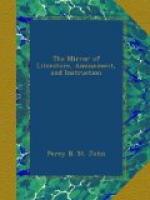“Those evening bells, those evening bells,”
were suggested, it is said, by hearing the Ashboume peal; and sweetly indeed do they sound at that distance, “both mournfully and slow;” while those exquisitely touching stanzas,
“Weep not for those whom the veil
of the tomb
In life’s happy morning hath
hid from our eyes,”
were avowedly written on the sister of an Ashbourne gentleman, Mr. P—— B——. But to his drolleries. He avowed on all occasions an utter horror of ugly women. He was heard, one evening, to observe to a lady, whose person was pre-eminently plain, but who, nevertheless, had been anxiously doing her little endeavours to attract his attention, “I cannot endure an ugly woman. I’m sure I could never live with one. A man that marries an ugly woman cannot be happy.” The lady observed, that “such an observation she could not permit to pass without remark. She knew many plain couples who lived most happily.”—“Don’t talk of it,” said the wit; “don’t talk of it. It cannot be.”—“But I tell you,” said the lady, who became all at once both piqued and positive, “it can be, and it is. I will name individuals so circumstanced. You have heard of Colonel and Mrs. ——. She speaks in a deep, gruff bass voice; he in a thin, shrill treble. She looks like a Jean Doree; he like a dried alligator. They are called Bubble and Squeak by some of their neighbours; Venus and Adonis by others. But what of that? They are not handsome, to be sure; and there is neither mirror nor pier-glass to be found, search their house from one end of it to the other. But what of that? No unhandsome reflections can, in such a case, be cast by either party! I know them well; and a more harmonious couple I never met with. Now, Mr. Moore, in reply, what have you to say? I flatter myself I have overthrown your theory completely.” “Not a whit. Colonel—has got into a scrape, and, like a soldier, puts the best face he can upon it.” Those still exist who were witnesses to his exultation when one morning he entered Mrs——’s drawing-room, with an open letter in his hand, and, in his peculiarly joyous and animated manner, exclaimed,




